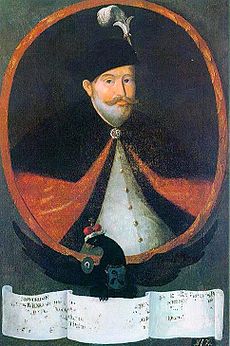Krzysztof Radziwiłł
Prince Krzysztof Radziwiłł | |
|---|---|
 | |
| Born | 22 March 1585 |
| Died | 19 November 1640 (aged 55) Świadość, Polish-Lithuanian Commonwealth |
| Spouse | Anna Kiszka |
| Children | with Anna Kiszka: Janusz Radziwiłł Katarzyna Radziwiłł |
| Parent(s) | Krzysztof Mikołaj "the Thunderbolt" Radziwiłł Katarzyna Ostrogska |
Prince Krzysztof Radziwiłł (Template:Lang-en, Lithuanian: Kristupas Radvila) (1585, Biržai – 1640) was a Polish-Lithuanian noble (szlachcic), and a notable magnate, politician and military commander of his epoch. Sometimes referred to as Krzysztof Radziwiłł II, to distinguish him from his father, Krzysztof Mikołaj 'Piorun' Radziwłł.
A proud magnate, sensitive to the point of ancestral honour and heritage, convinced of his vocation to play a leading role in the country. He was a successful military leader, but selfishness and pride divided his supporters and weakened his significance in the politics. As the leader of the Lithuanian Calvinists, he was often threatened and disliked by the zealous and ultra-Catholic King of Poland, Sigismund III Vasa.[1]
Biography
Owner of Biržai, he was Field Hetman of Lithuania from 1615, Castellan of Vilnius from 1633, Voivode of Vilnius Voivodeship from 1633,.[2] Great Lithuanian Hetman from 1635,.[2] starost of Mahilyow, Bystrzyca,[3] Žiežmariai and Seje. In 1632 he served as Marshal of the Sejm.[2]
He successfully fought in Polish Livonia against Sweden from 1600s to 1617. He took part in the campaign against the Swedes in the Baltic region in 1621–1622 (Polish-Swedish War), where he agreed to a controversial truce (as he had no permission to negotiate it from the king or the Sejm).[2] Important commander of Lithuanian forces during the Smolensk War, where he was instrumental in obtaining the capitulation of the Russian army in the relief of Smolensk.[2] Afterwards, in 1635, he retired from his military career, concentrating on administering his estates. A Calvinist, he was a great protector of Protestants in Lithuania.
He was an opponent of Catholic king Sigismund III Vasa, but a supporter of his more tolerant son, Władysław IV.[2] An advocate of Władysław's marriage to a Protestant princess, he distanced himself from the king after Władysław declined this marriage proposal. He opposed an alliance between the Commonwealth and the Habsburgs. On his lands in Kėdainiai he founded a major Calvinist cultural and religious centre,.[2] which flourished till the 19th century as a center of the Polish Reformed Church. His large horse stables were famous throughout Europe.
References
- ^ http://www.wilanow-palac.pl/krzysztof_radziwill_mlodszy_1585_1640_hetman_w_nielasce.html
- ^ a b c d e f g Jacek Jędruch (1998). Constitutions, elections, and legislatures of Poland, 1493–1977: a guide to their history. EJJ Books. p. 113. ISBN 978-0-7818-0637-4. Retrieved 13 August 2011.
- ^ http://encyklopedia.eduteka.pl/wiki/Krzysztof_Radziwi%C5%82%C5%82_%28m%C5%82odszy%29
- 1585 births
- 1640 deaths
- People from Biržai
- Secular senators of the Polish–Lithuanian Commonwealth
- Lithuanian Calvinist and Reformed Christians
- Polish Calvinist and Reformed Christians
- Polish Princes of the Holy Roman Empire
- Radziwiłł family
- Polish people of the Polish–Muscovite War (1605–18)
- Polish people of the Smolensk War
